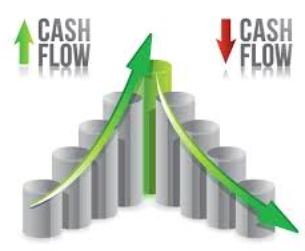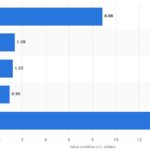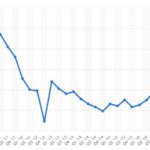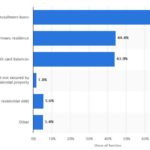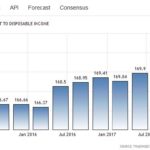I can not stress enough as to the importance of personally being in a positive free cash flow position. This article provides tips on how to achieve and remain in this state.
Introduction
Recent statistics show the consumer credit debt of households and non-profit organizations in the US amounted to ~$3.74T in Q3 2017. Judging from the following chart which reflects consumer credit debt of households and non-profit organizations in the US from Q1 2010 to Q3 2017, consumers did not learn their lesson from the Financial Crisis fallout.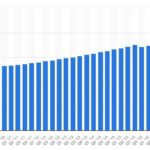
Source: The Statistics Portal
This statistic presents the value of debt by type owned by consumers in the US as of December 2017.
Source: The Statistics Portal
While US household debt service payments as a share of disposable personal income between Q1 2011 – Q3 2017 was heading in the right direction, I note a negative trend starting in Q4 2015. Perhaps too much time has elapsed since the Financial Crisis and consumers are letting their guard down.
Source: The Statistics Portal
Look at the magnitude of US families in 2016 which had debt.
Source: The Statistics Portal
You think Canada is any better? Not a chance. The following reflects household debt to disposable income in Canada.
Source: Trading Economics
In my opinion, these levels are alarming. I view too many consumers as being extremely vulnerable should we experience another economic downturn.
In this regard, I thought I would provide another article in which I express my thoughts on the importance of positive personal free cash flow. I also encourage you to read my Avoid the Seductive Trap of a Poverty Mindset, Staying Motivated on the Journey to Financial Freedom, Tips On Your Journey To Financial Freedom, You Want Financial Freedom? Rid Yourself of Debt, and Low Interest Rates Have Fanned Debt to Insane Levels articles.
Free Cash Flow (FCF)
FCF is one of the metrics I closely analyze when reviewing a company’s financial statements to determine whether it presents a sound investment opportunity. Since I pay significant attention to this metric when analyzing a company, I accord the same level of attention to this metric when reviewing our family’s finances.
For those unfamiliar with FCF, it represents the cash a company is able to generate after required investment to maintain or expand its asset base; it is a measurement of a company’s financial performance and health. On a personal level, it represents the variance between your family’s net income and all expenses incurred to maintain a lifestyle.
I strongly suspect the vast majority of people pay far closer attention to their personal net worth than to their personal free cash flow. In my opinion, however, focusing on net worth versus free cash flow can lead to incorrect financial decisions and without proper free cash flow, net worth can quickly dissipate.
Important Cash Flow Factors
When analyzing your family’s free cash flow you should consider:
- Frequency and Timing of inflows/outflows – is there a timing gap and, if so, how are you managing this gap?
- Diversification – are your income sources heavily concentrated or well diversified?
- Safety – how confident are you that your streams of income inflows will continue uninterrupted?
- Reliability/Dependability – do your inflows arrive like clockwork or are they susceptible to delays (eg. if you own rental properties, do some tenants pay like clockwork while others need prodding)?
Cash Flow Analysis Worksheets
I provide the following monthly cash flow worksheets which you can modify to meet your personal circumstances (ie. you may not need eight rows to track rental property income).
CDN Monthly Cashflow Worksheet
USD Monthly Cashflow Worksheet
If you have never analyzed your monthly cash flow I strongly suggest you monitor and track your expenditures on a DAILY basis for at least 3 months. Once you have compiled your inflows/outflows for the month then input the totals in the spreadsheets provided.
Almost every expenditure my family incurs is paid through our online banking platform or through the use of a debit card or credit card. By doing so I am able to download information from our online banking platform into Excel.
Once I have downloaded the information I can easily sort and classify the expenditures by category. In the rare case where I make a cash expenditure (fewer than 10 transactions per month) I manually record this information and add it to the downloaded information.
Fixed versus Variable Expenses
As the terms imply, some expenses are a given while others are susceptible to change. Rent, mortgage payments, car loans, car leases, bank loans, etc. are fixed expenses. Put yourself in a position where your fixed expenses are high and you’ll find that life is tantamount to running on a treadmill.
Variable expenses are the types of expenses which you can influence. If expenses fluctuate in value or the expense can be eliminated without any detrimental impact to your lifestyle then this would be a variable expense; this is the type of expense where a conscious decision can be made that will impact your personal FCF. An example of a variable expenditure is the cost associated with your daily coffee consumption.
Savings/Investments
This should be a top cash outflow priority. Strive to set aside a minimum of 15% of your gross monthly income. If your cash flow analysis indicates you are deploying a significant amount of your cash flow toward debt repayment then debt elimination should be a priority. It makes absolutely no sense to set aside money toward savings/investments if you have credit card debt, debt consolidation loans, etc.. This type of debt is being paid with after tax dollars and it is highly unlikely you will be able to achieve rates of returns at a reasonable level of risk that would match or exceed interest rates on the aforementioned types of consumer debt.
Quite frankly, the greater the interest rates on your debt the higher the priority should be on debt repayment/elimination.
Debt Repayment Strategies
We have experienced a low interest rate environment for several years. This has likely lulled many consumers to take on more than reasonable levels of debt.
Once a consumer realizes an unsustainable level of debt has been acquired and the time has come to focus on debt repayment/elimination, the elimination of non-tax deductible debt should generally be tackled before tax deductible debt. I say ‘generally’ because much depends on the interest rates and conditions of credit related to these obligations.
People differ when it comes to the manner in which debt is to be repaid. Some suggest a focus be placed on repaying the highest interest rate debt first. Others suggest the repayment of the smallest balance first and working your way up to paying off your largest balance last; this second method is otherwise known as the snowball effect.
In my opinion, you are far better off eliminating the highest interest debt first. Mathematically, you will pay less interest using this strategy.
Readers struggling with debt may wish to refer to tips on debt reduction put together by the Credit Counselling Society.
Principal Residence
Unless you differ from the norm, a significant proportion of your cash inflow will be deployed toward expenditures related to your principal residence. It is, therefore, extremely important that you track your monthly housing related expenditures; the cash flow worksheets for which I have provided links earlier in this article should help in this regard. The worksheets do not include an all encompassing list of expenses so please feel free to add additional rows to address your personal circumstances.
I highly suspect it will be an eye opening experience for some readers once all monthly housing related expenses have been tabulated. In particular, many new homeowners do not have a full appreciation of just how expensive it can be to operate a home. As time progresses, many homeowners come to the rude awakening they have more house than money.
Automobiles
Unless you reside in a large metropolitan centre where you can rely exclusively on public transportation or on some ride sharing program, a vehicle is a necessity.
In my opinion, vehicles generally have a huge negative impact of personal cash flow. Factor into the equation car loan/lease payments (I avoid these like the plague), insurance, gas, repairs, and all other ongoing car related expenses and you can find yourself spending several hundred dollars a month. Own multiple vehicles and then your monthly cash flow analysis could reflect a sizable number associated with vehicle related expenses.
Since vehicles are depreciable assets I prefer to buy a low mileage relatively recent model year vehicle. Do your research before making a purchase decision and you could save a significant amount of money!
Naturally, the lifespan of your vehicle will depend on a host of factors such as mileage and driving and weather conditions, etc.. Taking all these factors into consideration, I strongly suggest you do your utmost to keep your vehicle road worthy for as long as possible. If you are continually purchasing another vehicle every 2 – 3 years it becomes increasingly difficult to improve your personal cash flow.
If you fully repay any vehicle related loan and your vehicle is still road worthy, I strongly suggest you reallocate what was once directed toward car payments to the reduction of other debt. If you have no other consumer debt toward which you can deploy this new found free cash flow, I suggest you start setting aside these payments in a low cost money market ETF. While you may not generate a significant yield, that is not the intent with these funds. The primary purpose is to generate a pool of capital so that when you must purchase your next vehicle you can minimize the degree to which you must resort to financing.
Finding Cash Flow
There are countless ways in which to improve your cash flow but I thought I would specifically address a source many people overlook.
I suspect we all own things we highly value but have not looked at or have used in years. In my FFJ Portfolio – May 2018 Dividend Income Report I mentioned how my wife and I had recently been out of town clearing out my in-law’s principal residence in which they had resided since the early 1960s. If you have lived in the same place for several years I strongly suspect you have accumulated ‘stuff’ you no longer use. Surprisingly, some of this ‘stuff’ might be of value to other people.
Personally, I have an old coin collection I have not looked at in years. I also have a stamp collection consisting of multiple ‘first day issues’ and old stamps including stamps issued by Canadian provinces before they became part of Canada. I have no idea of their value but it sure is tempting to unload them given that I have not had any interest in these hobbies since my early teens. If I sell these items I could then redeploy this money to acquire fairly valued shares in high quality companies which will generate additional free cash flow!
If you have some ‘hidden assets’ you may want to give some thought to liquidating them and redeploying the sale proceeds so as to improve your personal free cash flow.
Final Thoughts
I place great importance on positive personal free cash flow which explains the number of articles I have written on this subject matter.
I can assure you that strong positive personal free cash flow will improve other aspects of your life. First and foremost, you will sleep better. Secondly, your stress level will drop. Circumstances that would likely turn the world upside down for someone with negative/negligible free cash flow will just slide off your back.
Life is too short to stress over finances. If you’re treading water or you’re in a negative cash flow position, take action to create positive personal free cash flow.
I hope you enjoyed this post and I wish you much success on your journey to financial freedom.
Thanks for reading!
Note: I sincerely appreciate the time you took to read this article. Please send any feedback, corrections, or questions to charles@financialfreedomisajourney.com
Disclaimer: I have no knowledge of your individual circumstances and am not providing individualized advice or recommendations. I encourage you not to make any investment decision without conducting your own research and due diligence. You should also consult your financial advisor about your specific situation.
I wrote this article myself and it expresses my own opinions.
Members of the FFJ community can access reports I generate on high quality companies which add long-term shareholder value. In an effort to help you determine whether my offering is of any value to you I am pleased to offer 30 days’ free access to all sections of my site. No commitments. No obligations. That’s 30 days from the time you register at absolutely no cost to you!


